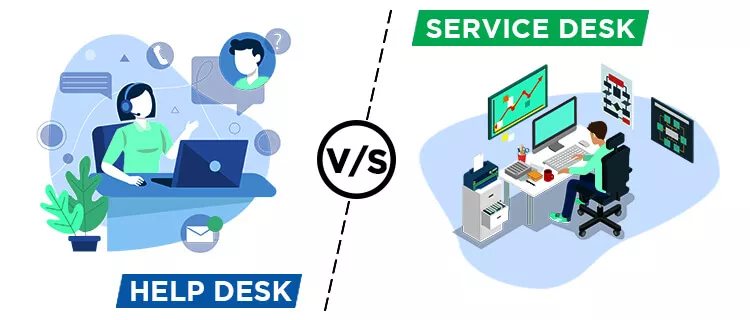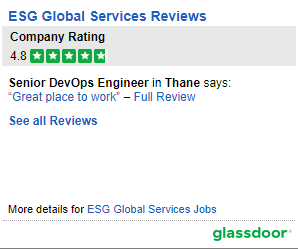A while ago, IT purists would have argued that Help Desk and Service Desk are two completely different services. But, with the evolution of technology, the distinction has started to fade to the level that they’re used interchangeably. While the end goal for these two is aligned, certain fundamental principles separate them at the crux. In this blog, we shall see which one is the right choice for your team by understanding what differentiates them from each other.
Help Desk vs. Service Desk: What Are the Differences?
- October 13, 2021
- Posted by: Subendhu Nayak
- Category: Information technology

What is IT Help Desk Services?
Reactive and tactical in nature, an IT Help Desk is focused on troubleshooting issues. It is a service that streamlines the entire process of customer support via a call, email or live chat. The primary function of an IT Help Desk is to provide quick resolutions for the users’ immediate needs and technical disputes. Often looked at as a “break-fix” solution, it gives your organization the power to solve reported issues, reoccurrences, and turnaround times. An IT Help Desk can either be a separate vertical or part of a more extensive service desk operation.
The key features include:
- Works as your Single Point of Contact for IT Support
- Uses tracking for all incoming incidents
- Supports service requests and SLAs for escalation
- Provides self-service options for end-users
- Lends tier-wise support
IT Help Desk is essentially a service reserved for incidental support, request management, and change enablement. At the end of the day, it focuses on getting the users back online as soon as possible.
What is a Service Desk?
Considered as a more holistic approach to IT, a Service Desk support is the single point of contact between an IT-provider and the customers. It goes beyond managing incident requests, handling complete communication with the end-users. The Service Desk has actually evolved from the IT Help Desk to form an integral part of the best practices under ITSM, which treats organizational IT as a service.
Instead of focusing on individual users, a Service Desk is focused on the overall enterprise objectives and their alignment with the IT functions. While there is a component of support, the general goal is to proactively look for opportunities that allow IT processes, including the Help Desk, to run smoothly.
Here are some distinguishing traits:
- Acts as a SPOC for all areas of IT, application and business functions.
- Provides self-service capabilities with an integrated catalogue
- Ensures comprehensive compliance with the SLAs
- Recommends updates to the equipment, practices and other services
Optimal for more mature organizations that need a full-blown ITSM solution, an outsourced Service Desk is responsible for managing complex IT systems, reliance on IT infrastructure and integration with third-party vendors.
Understanding Service Desk vs. Help Desk
In the 90s, the core goals of an IT team were to troubleshoot any issues that disrupted the operational workflow. Help Desks came into the picture as a solution for achieving this goal. The priorities and considerations of the users were given attention, and the systems were kept running day or night.
But, as technologies evolved, so did the users’ expectations. Today, excellent IT resolutions need to be coupled with an overall service that helps the organization progress. This is where a Service Desk takes the forefront. A Service Desk is built on understanding and delivering the business goals within a predefined timeframe.
On a basic level, a help desk provides immediate help while a service desk is focused on the overall IT services of the company. Whereas a help desk is limited to query resolutions, a service desk addresses those issues as well as tackles any service requests for change, upgrade and efficiency.
In summary, help desks take a more tactical role while a service desk is geared towards the strategic side of IT. A good service desk encompasses everything that a help desk can offer and additionally manages the growing IT needs of an organization.
Which service do you need? (Best practices for choosing the right service)
a. Onsite vs. Offsite
Remember, more is not always better. Understand what your organization needs before finding a service that fits the bill. While going for a service desk might give you more resources at hand, the lack of complex projects would lead to diminishing returns.
b. The Must-Haves
There are enough vendors in the market to get you confused. But, instead of getting caught up in a long list of services, you can reverse engineer your objectives to see how attractive those options really are. Ask yourself these following questions –
- What are your essential requirements?
- Would the additional services help you achieve those goals without making the process complicated?
Once you have the answers, then decide on what you need.
c. Letting go of the terminology
Help Desk and Service Desk are now and again used interchangeably by IT teams. Similarly, different service providers might have varied definitions of the service. It is vital to know how they are different and which vendor shall offer the service you need.
d. State-of-the-art is not necessary
The service that you choose shall be used by your IT team day in and day out. If the processes are too complex or the solution is constricted to a few functions, then your people might not be able to maximize their productivity, irrelevant to your investment.
The Right Answer
Contact us today to know the tool that shall take care of your IT processes holistically.
Whether you decide to go for an IT help desk service or a service desk, you’ll find that there are increasing benefits to automating your IT processes. Both services will mitigate your downtime with an improved and faster resolution cycle while making space for a tested knowledge base and incident tracking.
To help you make a decision, we at ESG Global Services offer flexible and bespoke service models with multi-channel solutions that can be scaled as per your organization. Working as a natural extension to your business, we only consider the elements that work the best for you.
London | Mumbai: +44 (0) 207 609 2800 | New York: +1 (0) 646 757 1645 | Email: [email protected]


